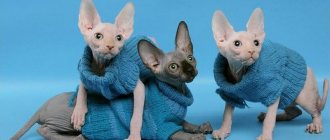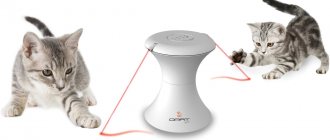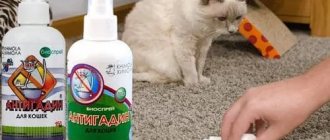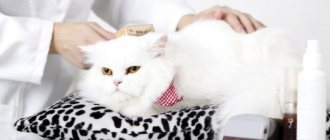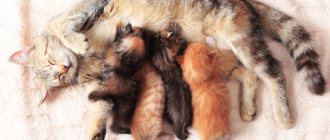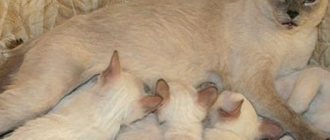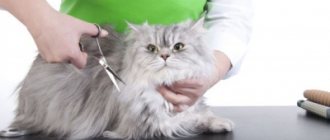People love sweets. Almost everyone, without exception, even those who convince themselves and others of the opposite. Love for something gives rise to our attitude towards this object as something taken for granted. We no longer control the amount of sweets we consume as closely as parents do with their young children.
Sometimes a person’s “little brothers” also get sweets. In particular, cats, which usually do not neglect the opportunity to enjoy dairy products, will never refuse condensed milk. It’s not surprising - according to the state standard, real condensed milk can only contain whole milk, cream, sugar and water. And if the safety of milk, cream and water does not raise questions, then with sugar everything is not so clear. So is it possible to give condensed milk to cats?
Special perception of taste
Any cat is primarily a predator. The main food of a predator is raw meat, or rather, animal white meat. A cat’s sense of smell is designed in such a way that the animal can recognize the smell of raw meat at a great distance from a potential victim. Some (mostly larger) representatives of the cat family can determine by smell how long ago the potential “food” died. This largely explains why even a domestic cat will never allow itself to eat stale meat or fish.
But here's what's really interesting: the receptors located in the cat's mouth are not able to recognize sweet taste. That is, purely hypothetically, a cat can eat as much sweet food as it wants without even feeling it. However, it is always worth remembering that the maximum consumption limits for various products for cats are several times lower than for humans.
For example, there have been cases when adult cats lost consciousness after eating a completely insignificant amount of chocolate by human standards. This is due to the high content of the hormone theobromine in cocoa beans, which in small quantities is an excellent tonic and stimulator of muscle activity. However, in large doses this hormone is dangerous even for humans, not to mention animals whose mass is only a few kilograms.
Should I feed my cat condensed milk?
Having studied the work of the cat’s body, it can be argued that even a little condensed milk can cause irreparable damage to the pet and significantly affect its condition. The cat does not feel the sweet taste of condensed milk, but only smells the milk. This product will not bring benefits to your pet, like other sweets, and therefore should not be included in his diet. If a cat loves and shows interest in condensed milk or begs for other sweets, you should not give in to this, and it is better, as a compromise, to treat your pet with natural unsweetened yogurt, cottage cheese or milk porridge.
The diet of pets should be varied. Veterinarians recommend including fermented milk products in it, but not all of them are healthy. Condensed milk is given to cats in exceptional situations, since it has not only beneficial properties, but also harmful ones. This product effectively helps with constipation, but it can only be given after consultation with a veterinarian.
Dangerous source of protein
Human preferences in food culture played a cruel joke on his pets. On the one hand, people want to eat “real” condensed milk, which contains whole cow’s milk and cream, and on the other hand, such a natural product attracts the attention of domestic cats much more strongly.
Once having tasted the contents of the coveted jar and, naturally, not feeling anything other than milk protein and the taste of cream, the cat will eat the product in the same quantity as it would consume sour cream or milk. Owners of domestic cats probably understand the volumes we are talking about. Ultimately, along with the “cream,” the cat will eat a huge amount of sugar without even noticing it. Giving cats condensed milk is highly undesirable and there are several good reasons for this.
How is it useful?
The product has high energy and nutritional value. The vitamins and microelements included in the composition have the following effects:
- increase immunity;
- normalize the digestion process;
- strengthen bone and muscle tissue;
- improve blood circulation;
- calm the nervous system.
By giving your pet condensed milk, the animal, in addition to healthy proteins and fats, receives completely unnecessary sugar.
Risk of developing diabetes
The amount of insulin required for the complete breakdown of sugar supplied with food is produced in a very limited amount in the cat’s body. This volume is not enough to process even small doses of sugar (after all, cats, being carnivores, practically do not need carbohydrates), not to mention a few spoons of condensed milk. In addition, the need for carbohydrates is largely determined by the animal's overall activity level. In stay-at-home cats it is reduced compared to more active representatives of the feline family.
Summarizing the above, consuming condensed milk can provoke diabetes in a cat, which will cause discomfort to the animal and a lot of trouble for the owners.
Can I give it to a cat?
Because of this product, the animal gets fat quite quickly.
Most veterinarians do not recommend adding condensed milk to a cat's diet. The main reason is poor insulin production. The cat's body does not tolerate glucose well, which leads to diabetes, weight gain and gastrointestinal problems. Even a small amount of sweets can cause diarrhea in a healthy animal. Therefore, condensed milk should not be given to cats. The exception is condensed cream and milk, which do not contain sugar. These products can be introduced into the kittens' menu after diluting them with water, as they contain a large amount of fat. Experts advise giving condensed milk only in emergency cases, for example, as a laxative for cats.
Risk of caries
Some owners are convinced that if you dilute a small amount of condensed milk with water, then consuming such a composition will cause virtually no harm to the animal. This is not true - in any case, this method will not prevent sugar from entering the cat’s digestive system.
Cats do not have the ability to brush their teeth, although even if they did, sugar would still cause irreparable damage to the enamel of the animal's small teeth. Oral diseases are one of the most painful for representatives of the cat family, and therefore their occurrence should not be provoked by unexpected inclusions in a balanced diet.
The benefits of condensed milk
Condensed milk can relieve constipation in cats. But only subject to prior consultation with a veterinarian and the absence of contraindications to the consumption of dairy products by animals. Preparing a sweet laxative is simple. Two teaspoons of condensed milk are diluted with water and poured into the cat's bowl. Usually cats eat this medicine with pleasure. The sweet mixture helps normalize the cat's stool.
Owners who want to pamper their furry pet with a protein treat are better off not opting for condensed milk. It is much healthier to treat your cat with a piece of meat - he will not refuse such a natural delicacy.
Use for constipation
Constipation is often observed in cats. In this condition, stool accumulates and hardens. The animal has difficulty with both diarrhea and constipation. It feels painful and uncomfortable. The causes of the disease may be the following factors:
- improper diet;
- accumulation of hairballs in the intestines after washing;
- ingestion of foreign bodies;
- sedentary lifestyle;
- dehydration of the body;
- neoplasms of benign and malignant nature;
- kidney diseases;
- worms and other parasites;
- inflammation and growths.
If a pet is sick, it may become lethargic, to which its owner must react.
When the disease manifests itself, cats behave differently, but it is not difficult to notice the disturbances. The pet can be absolutely calm and lethargic with a complete lack of appetite, or, on the contrary, it can run around the room and meow loudly. Constipation also causes bloating and vomiting. The animal noticeably loses weight, stops licking itself, and experiences difficulty breathing. The main indicator is a dry nose.
Before starting any treatment, it is important to consult a veterinarian. Only after a correct diagnosis can laxatives be used. The fact is that constipation's symptoms are similar to intestinal obstruction, and this disease is treated completely differently. Condensed milk is a good remedy for constipation in cats. Preparing a laxative is very simple. Need 2 tsp. Dilute condensed milk with water and pour into a saucer. As a rule, the animal eats this medicine with pleasure. This mixture easily and painlessly treats constipation. It softens the stool, after which the stool returns to normal. However, this method of treatment should be used only in a situation where the cat has no contraindications to consuming dairy products or any concomitant diseases.
What is the harm of condensed milk?
The product is strictly prohibited for feeding cats. Containing huge amounts of sugar can lead to irreversible processes in the animal’s body and even cause poisoning. A pet does not need sweets, even if it loves them very much. When consuming condensed milk, the following undesirable symptoms may occur:
After consuming such a product, your pet may experience purulent discharge from the nasal passages.
- vomit;
- diarrhea;
- excessive salivation;
- breathing problems;
- itching of the skin;
- purulent discharge from the eyes and nose;
- insomnia.
Despite the fact that dairy products are not contraindicated for cats, condensed milk is prohibited. Veterinarians warn that the glucose contained in the treat has a detrimental effect on your pet. Once in the body, it disrupts metabolism, after which problems with the coat begin. It loses its shine, falls out, and bald patches appear. Changes also occur in the oral cavity. Tooth enamel is destroyed, teeth crumble and fall out. Constantly feeding foods containing sugar leads to the death of your pet.
How many times have veterinarians and volunteers told the world that feeding cats from the table is not only harmful, but also dangerous for the animals’ lives. Nevertheless, it is easy to find dozens of videos on the Internet in which cute cats eat a variety of foods, from grapes to ice cream, and forum regulars still boast about the unusual taste preferences of their pets.
Of course, not all products are dangerous for cats and there is no need to become paranoid. Just for the safety of your pet and your own peace of mind, it is so important to know what can and cannot be given to cats. In this article, we will analyze the list of prohibited foods, the consumption of which will definitely not benefit your cat.
The most dangerous products
1. Raw meat, fish and eggs. Products that have not undergone the necessary heat treatment are a haven for parasites that can cause irreparable harm to health. For example, it is in this way that both the cat and the owners can become infected with toxoplasmosis. Neither treatment with boiling water nor freezing guarantees the absence of parasites in the final product.
2. Fat, lard, butter. Side effects of consumption include digestive upset, including vomiting and diarrhea, gastritis and liver failure.
3. Bones. Chicken bones crumble and split, getting stuck in the gastrointestinal tract; sharp edges can not only damage the mucous membrane, but also penetrate deeper into the internal organs or rupture the intestines, and fish bones, which are sharp in themselves, threaten the same problems and often stand across the throat.
4. Chocolate and cocoa. Unlike dogs, cats are not very greedy for candy, but there are also sweet tooths among them. However, chocolate is dangerous for both dogs and cats, regardless of taste preferences. The problem is that chocolate contains theobromine, which overloads the heart, increases blood pressure, and causes serious poisoning with possible death. And the alkaloid methylxanthine, also included in chocolate, causes a strong blow to the liver and leads to organ dysfunction.
5. Salt and sugar. In the case of cats, the thesis about white death is really close to the truth. Their body is not adapted to absorb sugars and salt in the concentrations characteristic of human food. And excess, in turn, threatens liver and kidney failure, gastrointestinal problems, diabetes and urolithiasis.
6. Alcohol. Everyone knows about the dangers of excessive alcohol consumption in people. But for cats, given their physiology and low weight, even a small amount of alcohol is toxic. Unfortunately, some owners still believe in the miraculous effects of vodka (and raw eggs) for a variety of diseases, thereby actually preventing the pet from recovering.
7. Onions and garlic. Even in microdoses, these products containing sulfoxides and disulfides have a catastrophic effect on the red blood cells of cats, leading to their death, that is, acute anemia. This condition can even cause death, therefore, you need to carefully ensure that onions and garlic are not in the food you give your cat. Various sausages, cold cuts, canned food and even baby food should be strictly prohibited for the safety of the pet.
8. Avocado. The product, praised by adherents of healthy eating, is not at all so beneficial for cats. Particularly dangerous are the seeds and peels, which contain significant amounts of substances toxic to your pet.
9. Grapes and raisins. Such seemingly harmless foods, eaten in small quantities by a cat, lead to acute renal failure.
10. Tea and coffee. Caffeine depletes the nervous system, overloads the heart and kidneys, and provokes dehydration.
11. Milk, condensed milk, ice cream, cheese and other dairy products. Cats practically do not digest lactose, so consuming products containing it can cause gastrointestinal upset.
You should also carefully study the compositions of complex products and semi-finished products to see if they contain anything from the list above. And it is necessary to ensure that the cat is not allergic to the product. If you have the slightest suspicion of poisoning, contact your veterinarian immediately.
Good luck to you and your pet, choose the right diet and be healthy!

